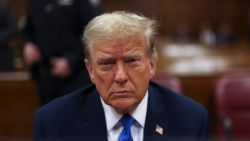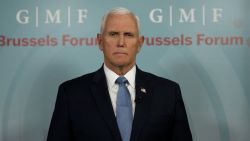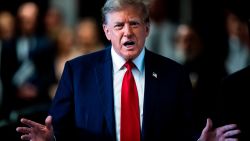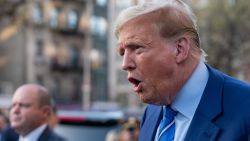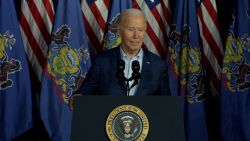The 2020 White House race is already looking like the “lock him up” election, with President Donald Trump’s legal fate on the ballot.
Sen. Kamala Harris of California started the fire by saying any future Democratic Justice Department would have no choice but to prosecute Trump. Then one of her rivals, South Bend Mayor Pete Buttigieg, backed a criminal investigation into an ex-President Trump, taking the issue into litmus test territory for Democrats.
Their comments mean that the nightmarish political legacy left by the 2016 election could stretch into the next presidency if Trump fails to win reelection.
They also mean that the President will not just be fighting for his political life next year but also could face a desperate personal motive to cling to the White House. He’s already signaled he might stop at almost nothing to win – after warning he would accept dirt on his opponents from Russia or China during the campaign.
Trump has not been charged with any crimes, and his White House considers the Russia election interference matter closed after the end of special counsel Robert Mueller’s investigation.
But there are strong reasons to think that the current Justice Department’s belief that a sitting President cannot be indicted may already have spared Trump charges in a campaign finance case – in which his former lawyer Michael Cohen was prosecuted and the President was effectively named an unindicted co-conspirator.
And Mueller left some Democrats thinking about possible future prosecutions when he said that even though he had concluded he could not indict Trump because of Office of Legal Counsel guidance, his investigation was justified as a way to “preserve evidence while memories are fresh and documents available.”
Democratic activists, still resentful of the “lock her up” chants and the President’s repeated calls for his 2016 foe Hillary Clinton to be prosecuted, would see the chance of a Trump case as rich poetic justice.
A full-bore campaign storm over Trump’s legal plight could significantly raise the already soaring political stakes even higher for 2020 and electrify both party’s bases. But it could also fuel the President’s repeated claims that there has always been a plot to cheat him of the presidency.
Facts and evidence?
Harris raised the question that could eventually hang over the first days of the next presidency in an NPR podcast.
“I believe that they would have no choice and that they should, yes. There has to be accountability,” Harris said, when asked whether the Justice Department ought to charge Trump with obstruction of justice.
On whether Trump could go to prison she said: “The facts and the evidence will take the process where it leads.”
Buttigieg jumped on the investigate Trump bandwagon in an interview published Wednesday in The Atlantic.
“To the extent that there’s an obstruction case, then yes, DOJ’s got to deal with it,” Buttigeig said. “I would want any credible allegation of criminal behavior to be investigated to the fullest.”
The comment came only a few days after House Speaker Nancy Pelosi reportedly said she’d prefer Trump to be in prison than impeached.
Trump did not seem to be perturbed when asked about the Harris comments.
“Oh, give me a break, she’s running for president, she’s doing horribly. She’s way down in the polls,” Trump said in an ABC News interview. “I heard she made that statement. And you know what, who wouldn’t? Probably if I were running in her position, I’d make the same statement.”
Trump’s intervention gave Harris a second bite at the controversy.
“He has engaged in a cover up. He’s obstructed justice. He openly welcomes foreign collusion. When I’m President, I won’t fear an independent Department of Justice, I’ll restore one. This president is a clear and present threat to democracy,” Harris tweeted.
Out of office, Trump would not be shielded from prosecution as he is as President.
Some commentary has suggested that by winning a second term, Trump could close off the possibility of prosecution in the Cohen case since the statute of limitations may expire by the time leaves office in 2025.
Claire Finkelstein, a Penn law professor, argued that the Justice Department stance that a sitting president cannot be indicted is erroneous. But it also in effect means that the statute of limitations on any cases allegedly implicating the president would be suspended.
“The clock, in other words, does not run during the period in which the Department of Justice takes the position that a president can’t be indicted,” she said.
In this interpretation of the law, prosecutors would have an opening to pursue the President whenever he leaves office.
Short-term gain, long-term pain?
In the short term, calls for an indictment of Trump could rally Democratic enthusiasm: It’s notable that the party’s presidential candidates have generally been keen to get on the record to call for impeachment.
But there’s also no doubt the President would pounce on the chance to brand the Democratic 2020 campaign as little more than an attempt at political persecution.
“We have people that are totally out of control. It’s the only way they think they can win the election,” Trump said, alongside the visiting Polish President on Wednesday. “So the Democrats were very unhappy with the Mueller report. So now they’re trying to do a do-over or a redo.”
An election debate about how to deal with Trump may also begin to shape the Capitol Hill debate about impeachment.
Pelosi is mindful of the possibility of a backlash and the fact that GOP senators would never vote to convict Trump in an impeachment trial.
But if she sticks by her decision not to open impeachment inquiries, all the political pressure now on her could transfer to a new Democratic president in 2021.
It is one thing for a Democratic primary candidate to threaten to prosecute an ex-president. It is another thing for a new president to press ahead.
Any new Democratic president in 2021 would be under pressure to use their first 100 days to make good on ambitious, hard-to-deliver promises to revolutionize the provision of health care and to ease the burden of student loan debt.
It’s hard to see how such a legislative leap would be helped by embroiling Washington in a new Trump drama.
Worth the heartburn?
A new president would also have to decide whether the specter of a new commander in chief seeking legal retribution against a successor would further poison the political system itself.
A Democratic president whose Justice Department went after a vanquished GOP predecessor might face similar accusations of using power to punish political enemies, as Trump and Attorney General William Barr are now facing.
It would not be the first time that a new president has had to balance demands from political supporters for legal retribution against a previous administration with the wider institutional and national responsibilities that come with their new office.
President Barack Obama, who railed against Bush administration war on terror interrogation practices as a candidate, did not in the end order a review into the officials who had carried them out after struggling to reconcile the idealism of his campaign and the hopes of his supporters with the practicalities of being commander in chief.
In a statement in April 2009, Obama said: “This is a time for reflection, not retribution. … We have been through a dark and painful chapter in our history. But at a time of great challenges and disturbing disunity, nothing will be gained by spending our time and energy laying blame for the past.”
For all the talk now, another Democratic president might come to a similar conclusion about the even more radioactive possibility of pursuing a previous president.
“If Kamala Harris were to become president, I don’t believe she would ultimately think it wise to prosecute President Trump,” said Finkelstein, who is also faculty director of the nonpartisan Center for Ethics and the Rule of Law.
“She would feel the same way that Obama did about the Bush administration officials who spearheaded the torture program. There simply was no percentage in it for him, as a new President with an agenda – with a long list of things he wanted to get done, and he would squander political capital.”
The next Democratic White House might also reflect on President Gerald Ford’s rationale for pardoning Richard Nixon over Watergate.
“That purpose was to change our national focus. I wanted to do all I could to shift our attentions from the pursuit of a fallen President to the pursuit of the urgent needs of a rising nation,” Ford said in 1974.
There is almost no chance a Democratic president would have the political incentive to pardon Trump. But they might be sympathetic to the political argument Ford made for ultimately shielding his successor from prosecution.




